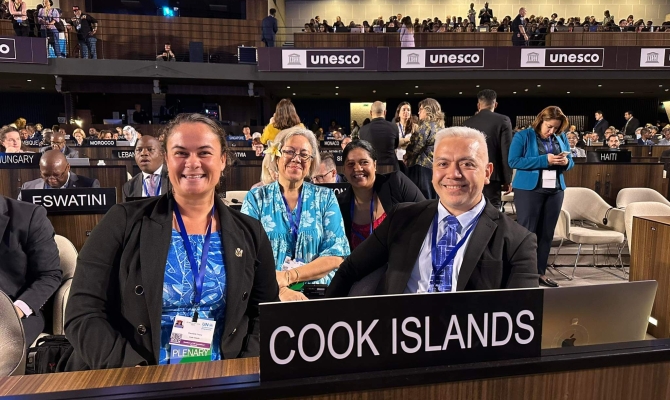National Environment Services director Halatoa Fua voices Cook Islands concerns
Wednesday 31 May 2023 | Written by Supplied | Published in Environment, National

Halatoa Fua, Director of the Cook Islands National Environment Service and the NES team at the second Intergovernmental negotiating committee to develop an international legally binding instrument on plastic pollution, including in the marine environment is taking place in Paris France from 29 May to 2 June 2023. SPREP/ 23053004
National Environment Service director, Halatoa Fua has made a plea at the second Intergovernmental negotiating committee to develop an international legally binding instrument on plastic pollution, including in the marine environment in Paris, France.
For Pacific island communities at the forefront of the impacts of the plastic pollution crisis, every minute of the day counts in the global effort to negotiate a legally binding instrument to address the problem.
Cook Islands pleaded on day two of the second session of the Intergovernmental Negotiating Committee (INC2) to develop an internationally legally binding instrument on plastic pollution, including in the marine environment, over an impasse involving procedural matters.
According to SPREP (The Secretariat of the Pacific Regional Environment Programme) deadlock over Rule 38 took up much of the conference’s time since it was opened on Monday by the President of France, Emmanuel Macron, who described plastic pollution as a “ticking time bomb” and called for urgent action to address the issue.
On Tuesday, Fua called on the conference to move forward. The intervention was greeted by a loud applause from hundreds of delegates at the Main Plenary Hall of the UNESCO Headquarters.
“By the end of today, over a billion single use plastic bottles will be produced in this very one day. We seek your direction and leadership to move this matter forward as quickly as possible because we are running out of time,” Fua said.
He said as a small island developing state, every minute counts and they cannot let procedural matters stall their progress for the very reason why they were there.
“Objecting to such consensual decisions will delay our progress in substantive discussions.”
“We do not think Rule 38 should be reopened as the provisional rules of procedure have been agreed as per the INC1 Report,” Fua said.
The Cook Islands plea was supported by the Alliance of Small Island States (AOSIS), who also supported the proposal for informal discussions to try and resolve the issues.
The Pacific Islands are represented by the Cook Islands, Federated States of Micronesia, Fiji, Kiribati, Nauru, Niue, Palau, Papua New Guinea, Samoa, Solomon Islands, Tuvalu and Vanuatu through the support of the Government of Australia and the United Nations.
They are supported by SPREP, working with partners the Pacific Islands Forum Secretariat, Office of the Pacific Ocean Commissioner, Environmental Investigation Agency, and Centre for International Environmental Law, University of Wollongong, WWF and Massey University.
Meanwhile, the latest figures show that over 380 million tons of plastic are produced yearly, 50 per cent of which is single-use plastic.
Only nine percent of the plastic manufactured is recycled, 12 per cent is incinerated, and the rest accumulates in landfills and the environment. Most of this plastic is washed into the Pacific Ocean, placing the lives of Pacific communities at risk.
Plastic accumulates in the food chain, contaminating water, soil, and air. Studies have found micro plastics in fish, a major food source for Pacific communities. It is against this backdrop that the Cook Islands implored officials gathering in Paris this week that there is no time to waste.
- SPREP












































